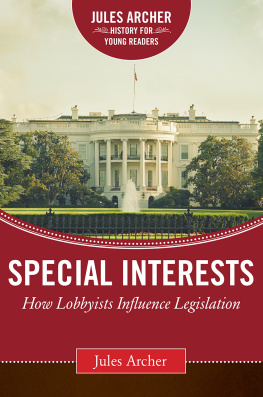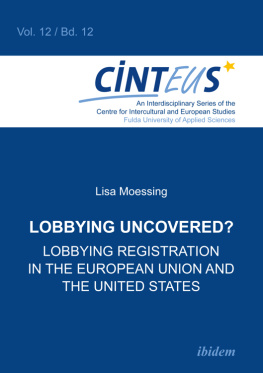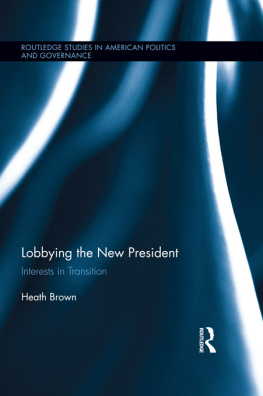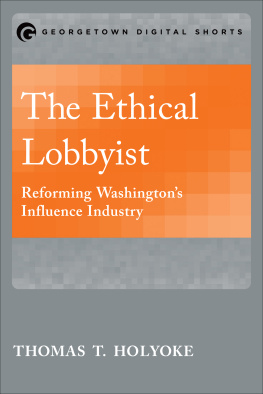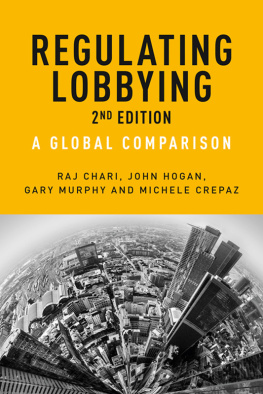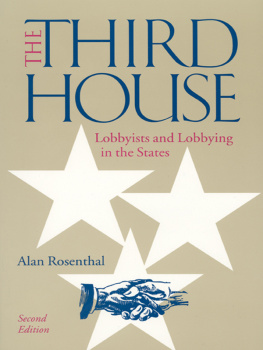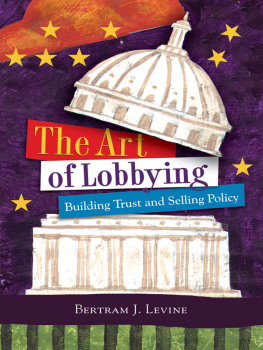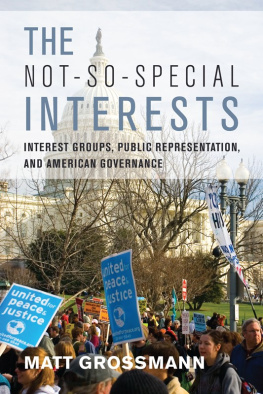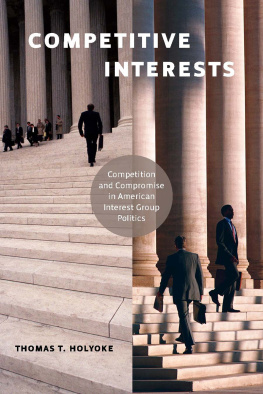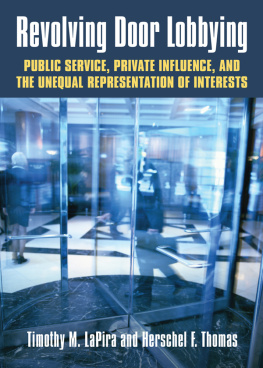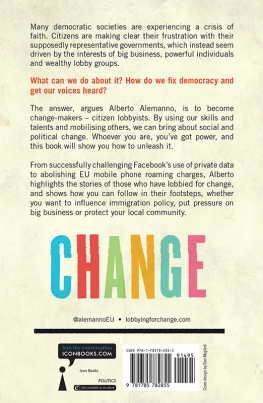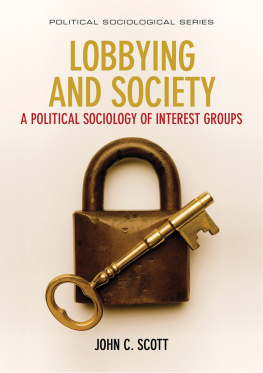INTEREST GROUPS AND LOBBYING

Westview Press was founded in 1975 in Boulder, Colorado, by notable publisher and intellectual Fred Praeger. Westview Press continues to publish scholarly titles and high-quality undergraduate- and graduate-level textbooks in core social science disciplines. With books developed, written, and edited with the needs of serious nonfiction readers, professors, and students in mind, Westview Press honors its long history of publishing books that matter.
Copyright 2014 by Westview Press
Published by Westview Press,
A Member of the Perseus Books Group
All rights reserved. No part of this book may be reproduced in any manner whatsoever without written permission except in the case of brief quotations embodied in critical articles and reviews. For information, address Westview Press, 2465 Central Avenue, Boulder, CO 80301.
Find us on the World Wide Web at www.westviewpress.com.
Every effort has been made to secure required permissions for all text, images, maps, and other art reprinted in this volume.
Westview Press books are available at special discounts for bulk purchases in the United States by corporations, institutions, and other organizations. For more information, please contact the Special Markets Department at the Perseus Books Group, 2300 Chestnut Street, Suite 200, Philadelphia, PA 19103, or call (800) 8104145, ext. 5000, or e-mail .
Library of Congress Cataloging-in-Publication Data
Holyoke, Thomas T.
Interest groups and lobbying : pursuing political interests in America / Thomas T. Holyoke,
California State University, Fresno.
pages cm
Includes bibliographical references and index.
ISBN 978-0-8133-4582-6 (e-book) 1. Pressure groups
United States. 2. LobbyingUnited States. I. Title.
JK1118.H563 2014
324.40973dc23
2014004150
10 9 8 7 6 5 4 3 2 1
FOR
Mom, Dad, and Melanie
CONTENTS
A recent article in the Washington Post quoted several professional lobbyists saying that lobbying was a profession that could not really be taught (Goldman 2012). It had to be experiencedmeaning those who practiced the profession could only learn it by doing it. As Mike House, who works for the private for-hire lobbying firm Hogan Lovells, said to the Post, Its all about good instincts. And instincts can never be taught. Having worked for interest groups on and off for about eight years, as well as having been an occasional lobbying target when I worked on the staff of the New York State Senate, I am inclined to agree with Mr. Houses assessment. That makes writing a college textbook about lobbying intimidating. Actually none of the lobbyists I know, and I have known many, ever intended to become lobbyists when they were in college. When life suddenly deposited them into the profession, they had to learn it by instinct, though most of them also benefited from mentoring by older, more experienced lobbyists. Still, I doubt that I can teach anybody how to lobby, and this book is in no way a lobbying manual.
I can, however, teach college students a fair amount about what interest groups are and why they exist, as well as what lobbyists are and how lobbying works in the most generalized sense. That is what this book is about, and I think it is worthwhile to know. The number of interest groups and lobbyists in national politicsand, I strongly suspect, at the state and local levelsis rapidly growing. Even organizations that traditionally stayed out of blatant advocacy politics are now jumping into the advocacy game. An obvious recent example is the Heritage Foundation, the formerly academic-like think tank that is reorienting itself as a bold advocate for conservative ideas and policies (Milbank 2012). American citizens are abandoning their traditional political parties, and too often they do not vote, but they are supporting ever more interest groups, either through their direct participation or with their money. The US political system is a system of interest group politicsthat is, policy being made by competing interest groupsand every student should realize this fact and try to understand it, even if they are not political science majors or do not want to be lobbyists. After all, nearly every student will go on to join one or more interest groups in their lives, if they are not already members! In this book I lay out and explore the basic ideas of interest group politics and provide details on how it works. For students who do go on to be lobbyists, I hope this means the gap that instinct must fill between knowing and professionally doing will now be smaller.
If I have made mistakes in my facts or in how I understand prevailing theories, I accept all of the blame. None goes to Toby Wahl at Westview Press, who asked me to write this book. Thank you very much for the wonderful opportunity to distill nearly everything I know about interest groups and lobbying, academic learning and personal experience, into a book for undergraduate and graduate students. I was so excited about the prospect that I laid out this books basic structure within five minutes of being asked to write it! Special thanks also to Ada Fung at Westview Press, who took over the project and drove it forward with an enthusiasm and efficiency that helped me sustain my own enthusiasm. Good editors terrify me because they show me how inadequate my own writing can be, and my initial development editor, Brooke Maddeford, was exceptionally harsh while also being very nice. The same can be said of my project editor, Rachel King, and my copyeditor, Beth Wright of Trio Bookworks. Thanks for all of your help.
I want to thank my colleagues Jeff Cummins, Mike Heaney, Melanie Ram, and Heath Brown, who were all kind enough to read through parts of this manuscript and give me their insightful comments. Then there were the fourteen people who reviewed my manuscript. Fourteen! Id like to thank for their invaluable feedback Mark Brewer (University of Maine), William Byrne (St. Johns University), David Damore (University of Nevada, Las Vegas), Rodd Freitag (University of Wisconsin, Eau Claire), Bryan McQuide (University of Idaho), Chapman Rackaway (Fort Hays State University), Laura Woliver (University of South Carolina), and the seven reviewers who chose to remain anonymous.
I have a few last points to make about writing this book. First, I must acknowledge the interest group textbooks already on the market that are very good and written by people I deeply respect. I believe my book is different in many ways from theirs and values their contributions while also adding to them. Second, because a lot of interest group politics and lobbying must be experienced to be understood, not only have I tried to include lots of direct quotations in this book, but I also felt it important to do a little field research for it, even though the book is not a work of primary research. So thanks go to the many lobbyists, interest group staff, legislative staff, and administrative agency staff who gave me their time when I was in Washington, DC. Thanks to the Office of the Provost and the Henry Madden Library at California State University, Fresno, for funding the trip and the sabbatical. And thanks to the American Political Science Association for giving me office space in the Centennial Center during my time in Washington. Third, I have never written for students before. Although I had ideas of how I might do it, I decided to actually have my students read an early draft of the manuscript and provide feedback on whether it made any sense at all to them. I teach a course on interest groups and lobbying, so it was easy to assign my manuscript. Not only did this give me an opportunity to see how it worked in an actual class, but I also encouraged my students (yes, by offering extra credit) to provide me with comments on the manuscript and how they thought it might be improved. That turned out to be surprisingly valuable (and a little painful), so thanks to Brooke Smith, Caitlin Ryan, Xavier Vasquez, Jessica Boujikian, Rebecca Levers, Juan Santiago, Patrick Simon, Brittani Smith, and Roxanne Castillo.
Next page

